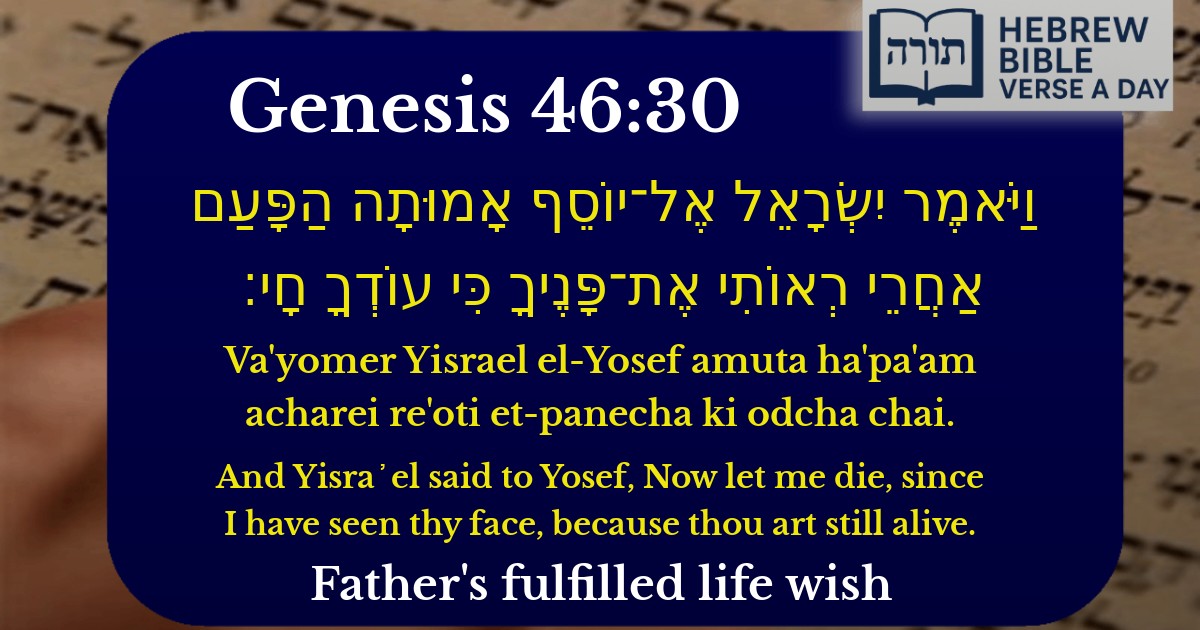Join Our Newsletter To Be Informed When New Videos Are Posted
Join the thousands of fellow Studends who rely on our videos to learn how to read the bible in Hebrew for free!
Hebrew Text
וַיֹּאמֶר יִשְׂרָאֵל אֶל־יוֹסֵף אָמוּתָה הַפָּעַם אַחֲרֵי רְאוֹתִי אֶת־פָּנֶיךָ כִּי עוֹדְךָ חָי׃
English Translation
And Yisra᾽el said to Yosef, Now let me die, since I have seen thy face, because thou art still alive.
Transliteration
Va'yomer Yisrael el-Yosef amuta ha'pa'am acharei re'oti et-panecha ki odcha chai.
Hebrew Leining Text
וַיֹּ֧אמֶר יִשְׂרָאֵ֛ל אֶל־יוֹסֵ֖ף אָמ֣וּתָה הַפָּ֑עַם אַחֲרֵי֙ רְאוֹתִ֣י אֶת־פָּנֶ֔יךָ כִּ֥י עוֹדְךָ֖ חָֽי׃
וַיֹּ֧אמֶר יִשְׂרָאֵ֛ל אֶל־יוֹסֵ֖ף אָמ֣וּתָה הַפָּ֑עַם אַחֲרֵי֙ רְאוֹתִ֣י אֶת־פָּנֶ֔יךָ כִּ֥י עוֹדְךָ֖ חָֽי׃
🎵 Listen to leining
Parasha Commentary
📚 Talmud Citations
This verse is not quoted in the Talmud.


Yaakov's Emotional Declaration
The verse (Bereshit 46:30) records Yaakov's profound emotional response upon reuniting with Yosef after believing him dead for many years. Rashi explains that Yaakov was expressing that his life was now complete, having seen Yosef alive. The phrase "אמותה הפעם" ("Now let me die") does not indicate a literal wish for death, but rather a sense of fulfilled purpose - having witnessed this moment, Yaakov felt he could depart from this world in peace.
Spiritual Completion
The Kli Yakar offers a deeper interpretation, suggesting that Yaakov feared his spiritual perfection was incomplete while separated from Yosef. Seeing Yosef alive and righteous (despite his trials in Egypt) confirmed that the Divine Presence (Shechinah) still rested upon Yaakov's family. This spiritual reassurance allowed Yaakov to feel his mission was complete.
Chassidic Perspective
The Sefat Emet explains that Yaakov's statement reflects the principle that tzaddikim (righteous individuals) achieve their complete spiritual form when all their "parts" (in this case, his children) are united in holiness. The reunion with Yosef represented the restoration of Yaakov's complete spiritual self.
Grammatical Insight
Ibn Ezra notes the unusual phrasing "אחרי ראותי" ("after seeing") rather than the expected "כי ראיתי" ("for I have seen"). This suggests Yaakov was referring not just to the present moment of seeing Yosef, but to the ongoing reality that Yosef was alive - he could now die peacefully knowing Yosef would continue living.